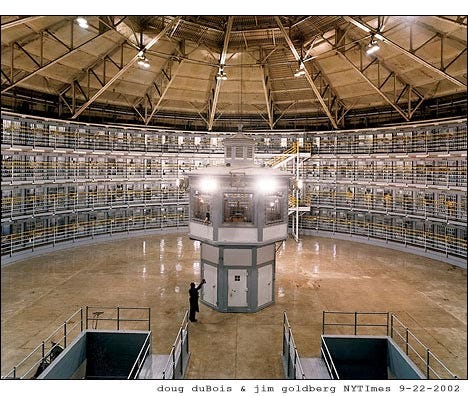Panopticon Part II: RTO v WFH
The now-new-normal: "remote work is morally wrong" and "bullshit"
Welcome to your life
There's no turning back
Even while we sleep
We will find you
Acting on your best behaviour
Turn your back on Mother Nature
Everybody wants to rule the world
It’s nothing new. Power-drunk egomaniacal control freaks constantly searching for more power and more control. Just more everything, it seems. Everything is never enough, and everybody is merely a piece to be played.
Work from Home was just another manipulation mechanism deployed by those with power to consolidate and conserve control. For this to work, they needed to entitle and ennoble the heroic, dedicated front-liners as essential. All others as inessential, I guess. And now, too indolent to be independent.
We were not essential, we were told. So my colleagues and I were sent packing, laptop in hand, to Work From Home. Never mind that we, individually and collectively, had been begging for that opportunity for months prior. Not full time, but at least some time. But nay, this is an In-Person Job, we were scold-told. Really?
March 16, 2020 begs to differ. It was, in retrospect, rather Panopticonish: multiple daily Zoom meetings, TEAMS check-in times, task-list touch-base, metric-based activity schedules, 4 pm emails with reply-receipts. Much of the work was the same - data entry is data entry, a phone call is a phone call - whether at a desk in a cubicle at the office or at a table in the kitchen at the home.
…Tesla CEO Elon Musk has always trashed working from home. His most recent rampage against remote work in an interview with CNBC called it “morally wrong” and “bullshit.” Musk argues that “people are more productive when they’re in person.”
For me, this is a personal-professional mission-quest. I teased in a post last month that I would share some career news. I landed a fully-remote sales role. I am now a 100% Work From Homer! I can’t yet share all of the details, but my territory is the entire So Cal market, and I will be selling food and food services for an iconic national brand.
That means I give up my gig at the Hollywood Bowl. It’s a bittersweet decision that pits the value of inclusion on a physical-location-based team against the promise of autonomous self-motivation while part of a virtual team. I feel the pull of each.
Each situation is vital to growth. We are not the same as we were before the lockdowns, individually or societally. We just are not. It’s been three years of our lives, and we are the experimental subjects that these studies purport to reveal. We are the workers they studied and statisticized. Have we no say?
Let’s find out why they are forcing the square peg of pre-pandemic life into the round hole of life afterwards. This exigency leaves us with little room to maneuver. Why this command to comport? Have we no agency of our own? Must we be coerced, corralled, counted, and controlled just to be productive?
The familiarity of routine, to get up and go to work, is an ethos so ingrained in my being of what it means to not only be a man, but to be American.
Work is so much more than the sum total of our professional activities, it’s our societal personae. The backbone of conversation is asking “what do you do?” To which we hardly ever answer with a verb, “I do this or that”. It’s always a noun, “I am a fill-in-the-blank.”
The loudest voices demanding RTO appear to be the very ones that have the most on the line - banks with massive exposure in commercial office space. Servicing that debt without butts in seats must chap the ass of every CEO, and they’re starting to snap.
Like a neighborhood dope slinger unloading a kilo on front, the CEO’s are being stepped on by their dealers to crack the nut. Unable to, their mood dours and their anger burns. Shit rolls downhill, and workers are at the bottom.
Frontier CEO Barry Biffle holds employees in such high regard, as expressed by his latest comments at, where else, a conference hosted by Morgan Stanley. “We got lazy in COVID,” the budget airline boss complained at an investor conference hosted by Morgan Stanley on Wednesday. “I mean seriously, people are still allowing people to work from home. All this silliness, right? All that’s out the window.”
In a great piece written by Rebecca M. Knight, Why are CEOs still so intent on taking worker attendance?, the concept of Panopticon has its fingerprints all over this critical cajoling.
These may be legitimate concerns, but Daisley argues they also reveal a crack in the management façade. "It speaks to the state of corporate anxiety," he says. "Employers feel a lack of control and they're trying to reassert themselves."
Jay Sterling Silver, a law professor at St. Thomas University School of Law, in Miami, who's written about attendance policies in higher education, agrees. He says that while it's true in-person teamwork can spark creativity and build camaraderie, tying worker performance to office attendance reveals a desire by employers to maintain the upper hand.
"Control is a powerful aphrodisiac," he says. "And the requirement that people go through the costly steps of showing up for you, are compelled to show respect – whether genuine or otherwise – when they pass you in the hallway and are available to you at a moment's notice help scratch that itch for control."
My predisposition in life is to be contrarian, to disagree, to resist. My first post on this subject dropped last month, and in it I argued that productivity and collaboration are the bull and the shit, and forcing workers to complete roll-call at the office is the true moral wrong.
To me, this is nothing more than looking busy. I get all of the legit takes about workers that work at work. There are real needs that are only met by boots on the ground, to speak in cliches. We all get that - plumbers don’t roto-rooter virtual shit and fires aren’t put out by remote.
My goal here is to go beyond that triteness, to get at the root of productivity, which is personal motivation. Why do we produce something of value for legal tender? Is it just money? Can we ascribe higher purposes to contracted duties? Do we possess professional pride, as a society?
Often, when moguls self-describe their foundational efforts to build empires, it’s epic tales of vision, sacrifice, and avarice. I firmly believe vast swaths of employees begrudge not the initial impetus for world-changing greatness but the smug surety that impels and imperils this fragile ego-centric approach to back to office regimes.
All of a sudden, these rhabdomancers of regularity, these pronouncers of predictability, these harbingers of habituality issue decrees of high magnitude, for all to hear. Lend me your ear, so I can crack your back. To make a buck.
I love the whole “lack of productivity” argument, which mostly goes like this:
lack of meaningful communication
reduced spontaneous collaboration
diminished new/veteran staff interactions
blurring of work/life boundaries
no supervision or direction
Judging from the name-calling and punitive measures now on the line, it appears the last bullet point is the real nut-kicker. The official pablum barely masks the earnest condescension.
Added to this is a lack of motivation for some when working remotely. Without the communal environment of an office, some individuals may find it difficult to maintain enthusiasm and focus on tasks.
I don’t know about you, but that sounds like a load of pure steaming horseshit. Upon hearing of Apple’s modest three-day RTO policy, good ole Mr. Evil, er Musk’s tweet says out loud what most workers believe to be their CEOs default mindset: Employees are lazy dogs that must be whipped to work.
Another boss, Australian luxury real estate Gurner Group’s chief executive Tim Gurner, had this to say at an Australian Financial Review conference. Yeah, real estate, hmmm.
Employees feel the employer is extremely lucky to have them, as opposed to the other way around.
We’ve got to kill that attitude, and that has to come through hurting the economy,”
Post-Utopian Panopticon
Nobody. But we don’t want that. Happy Labor Day. My writing has been pretty spotty over the summer. I guess I quiet-quit w…
It’s much more complicated, obviously, than a good versus bad paradigm, although you couldn’t discern that from reading the memo from the CEO/Human Capital Expert Jamie Dimon of JP Morgan
"Our leaders play a critical role in reinforcing our culture and running our businesses," the bank's operating committee wrote in the memo seen by Reuters on Wednesday.
"They have to be visible on the floor, they must meet with clients, they need to teach and advise, and they should always be accessible for immediate feedback and impromptu meetings’ Jamie Dimon, along with Wall Street counterparts at Goldman Sachs Group Inc and Morgan Stanley, has been a strong advocate of in-office work. He has also expressed concern about the downsides of long-term remote work.
JPMorgan reminded staff on hybrid schedules that they were required to be in the office at least three days a week.
"There are a number of employees who aren’t meeting their in-office attendance expectations, and that must change," the bank said. Managers may include attendance as part of performance reviews and could take "corrective action" if requirements were not being met.
Of course Congress is chipping in with this broadside aimed squarely at government workers, with Senator Joni Ernst (R-Iowa) telling reporters last week
You have bureaucrats that are doing bubble baths during their conference calls for work. So you federal employees that are out there, we’re coming after you.
In a meritocracy, how much value does perfect attendance contribute to goal achievement? Does an employee’s physical attendance, in and of itself, determine success or failure of a metric? Is attendance more important than morale? Is attendance a proxy for respect? Are you OK with swipe cards being your attendance log? And benefits and perks being assigned or removed due to attendance?
Much has been written and said about attendance, both in business and academia. As we all know, a certain writer went to a new school every year, so my perspective is as an outsider to every situation I encountered.
Attendance without participation is worthless. Participation without comprehension is useless. Comprehension without application is meaningless. We have a crisis in participation and comprehension, not attendance.
Human Beings are not osmosis creatures. Perfect attendance is predicated upon that principle: proximity to knowledge is equivalent to gaining knowledge. It is not.
The legacy of Panopticon in modern society
The man credited with conceiving the Panopticon is philosopher Jeremy Bentham, but he always redirected that praise to his brother, so described here
“His brother Samuel was working in Russia on the estate in Krichev and he had a relatively unskilled workforce, so he sat himself in the middle of this factory and arranged his workforce in a circle around his central desk so he could keep an eye on what everyone was doing.”
Hmmm, works for a factory. Could work for a prison. Would work for a school. Should work for a cubicle farm. Are we here? I say yes.
Bentham went to visit his brother in the late 1780s, saw what he was doing, and decided the centralised arrangement could be applied to all sorts of different situations - not just prisons but factories, schools and hospitals.
divide et impera
What happens when we are watched? To be more direct, what happens when we think we are being watched? A lot of things happen. To us, individually. And to us, societally. It drills into our psyche. It alters our behavior. It creates a bifurcated existence: watchers and watched.
Modern-day Panopticon is nothing more than an updated form of divide and conquer, an ancient warfare tactic coined 300 years before Christ, by Alexander the Great’s dad no less. The concept was deadly as executed by Julius Caesar and Napoleon.
Constant surveillance, or the belief that one is under it, will cause in the watched to morally improve their behavior. That improvement will translate into higher and more profitable productivity. At least that is the underlying premise of Panopticon.
The world’s richest man branding his own employees as morally inferior because some of them express reluctance to return to a centralised location to be arranged “in a circle around his central desk so he could keep an eye on what everyone was doing” sounds eerily like modern-day Panopticon.
As described by Philip Schofield, professor of the History of Legal and Political Thought and Director of the Bentham Project at UCL, the principle of modern-day Panopticon is
. . . central inspection. You can do central inspection by CCTV. You don’t need a round building to do it. Monitoring electronic communications from a central location, that is panoptic. The real heart of Bentham’s panoptic idea is that there are certain activities which are better conducted when they are supervised.
In many ways, the watchtower at the heart of the panopticon is a precursor to the cameras fastened to our buildings – purposely visible machines with human eyes hidden from view.
I introduced you to Nishant Jain in the last post, because as serendipity would have it, his initial post on the concept of Panopticon brought a new-to-me, and refreshingly upbeat, perspective to my framing of the issue.
I’m proud to say that some of you have subscribed to The SneakyArt Post after my last post, so thank you for supporting the creators at Substack.
I’d like to think that Substacks approach is contrary to the concept of Panopticon, if not downright antithetical to it. There is no control tower here. There are no watchers or watched. There are creators and those that support creators. Each striking their own bargains on their own terms for their own needs and wants.
Of course metrics, stats, and data points are necessary. That’s information needed to complete the transaction (a communicative action or activity involving two parties or things that reciprocally affect or influence each other). I don’t sell it or spam it, and you click it or don’t. We’re not divided, we’re together.
In his latest installment on this topic, Nishant concludes with three actionable bullet points that illustrate the idea (intended!) It’s fascinating to feature a post titled Prison Break that I didn’t pen.
Many of you tell me that you don’t agree with all that I write. But many of you also tell me that you read me because of that.
Ric
Too much agreement kills a chat
Extra Credit: Internalized Authority and the Prison of the Mind: Bentham and Foucault's Panopticon







First: Congrats on the new gig!!
Ah yes, Barry Biffle; the CEO who oversaw the outsourcing of almost his entire company. Yes, let's definitely listen to more of what he has to say about the pandemic and the future of work in America.
So, as you might know, I work for an airline (not Frontier), and was deemed "essential" almost immediately. We even got the cute/kinda official-looking letter just in case the government started setting up travel checkpoints like they did in Europe. It might actually still be in my car?
Anyway, in the deepest days of the pandemic, it felt like going to work was an important bit of structure in a life turned upside down. Everything was absolute chaos, but if nothing else, I knew I had to report top work 5 days/week. That said, I would love to work from home, and if I could figure out how to work a flight from my living room, I'd do it.